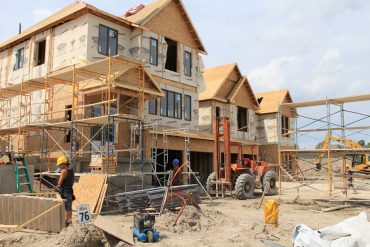
By Casey Edge
Mortgage test adds stress, not affordability
Canadian ContractorCanada’s stress test may to be doing more harm than good
New Canadian mortgage rules came into effect on January 1, 2018. Under the new rules, all Canadian home buyers must undergo a mortgage stress test – even if they make a down payment of 20 per cent or more. Previously, buyers would only have to stress-test their mortgage if they made a down payment of less than 20 per cent. For uninsured home buyers (anyone who qualifies with a down payment of 20 per cent or more) the minimum qualifying rate is based on either the Bank of Canada’s five-year benchmark rate (currently 5.34 per cent) or the rate offered by your lender plus 2.0 per cent — whichever is higher.

The mortgage stress test is now preventing many Canadians, particularly the younger generation, from entering the housing market, says the VRBA’s Casey Edge. (photo: John Bleasby)
Market activity has declined noticeably
The consequences are severe. It is estimated the stress test has reduced home buyers’ purchasing power by 20 percent. Even more, after introduction of the stress test, national home sales fell 11 per cent last year. Sales dropped 32 per cent in Vancouver and 16 per cent in Toronto. Nationally, sales continued downward, with another 4.1 per cent drop in the first quarter of 2019. As a result, many in the industry, including Mortgage Professionals Canada (MPC), are calling for reducing the stress test.
However, in a letter to the House of Commons finance committee, CMHC CEO Evan Siddall opposed MPC’s request saying, “In fact, the stress test has helped moderate house prices, making home ownership easier.” Further to that, Canada’s banking regulator, the Office of the Superintendent of Financial Institutions (OSFI), has said the purpose of the stress test was not, in fact, to moderate home prices, but to protect home buyers from unmanageable debt. That added debt would take the form of mortgages with higher interest rates. That now seems doubtful — a recent poll of analysts predicts the Bank of Canada is unlikely to raise interest rates until the end of 2020. There may even be a cut, depending on talk out of the U.S. and recent international trade issues impacting our economy.
Real-world rates are well below the qualifying benchmark
It’s instructive to look internationally at mortgage stress tests. For example, the Australian government decided to end its mortgage stress test because interest rates were continuing at record lows levels which are “likely to remain for some time.” That government is allowing banks to set their own minimum assessment rates.
However, the strongest case for removing, or at least moderating, the stress test is this: Canadians can now acquire 10- year rates below the Bank of Canada’s posted rate of 5.34 per cent, the qualifying benchmark for the stress test. Banks are posting fixed rates as low as 2.99 per cent for 10 years, a strong indicator that rates are not moving up any time soon.
If home buyers, especially young families, can get a 10-year fixed mortgage below the Bank of Canada’s five-year posted rate, it serves no purpose to undermine their purchasing power by 20 per cent with a stress test.
Where’s the benefit?
Clearly, the numbers suggest that the stress test is now doing more harm than good, especially for the younger generation, if housing affordability is a priority as the government claims. In fact, Ottawa’s policy is now directly responsible for undermining housing affordability, and therefore the ability of contractors to supply homes, a major contributor to our economy.
Home building impacts employment, skills training and the prosperity of every community across Canada. It’s time for more flexibility in this changing market.
 Casey Edge is CEO of the Victoria Residential Builders Association and a passionate advocate for the home building industry in Canada.
Casey Edge is CEO of the Victoria Residential Builders Association and a passionate advocate for the home building industry in Canada.

Leave a Reply